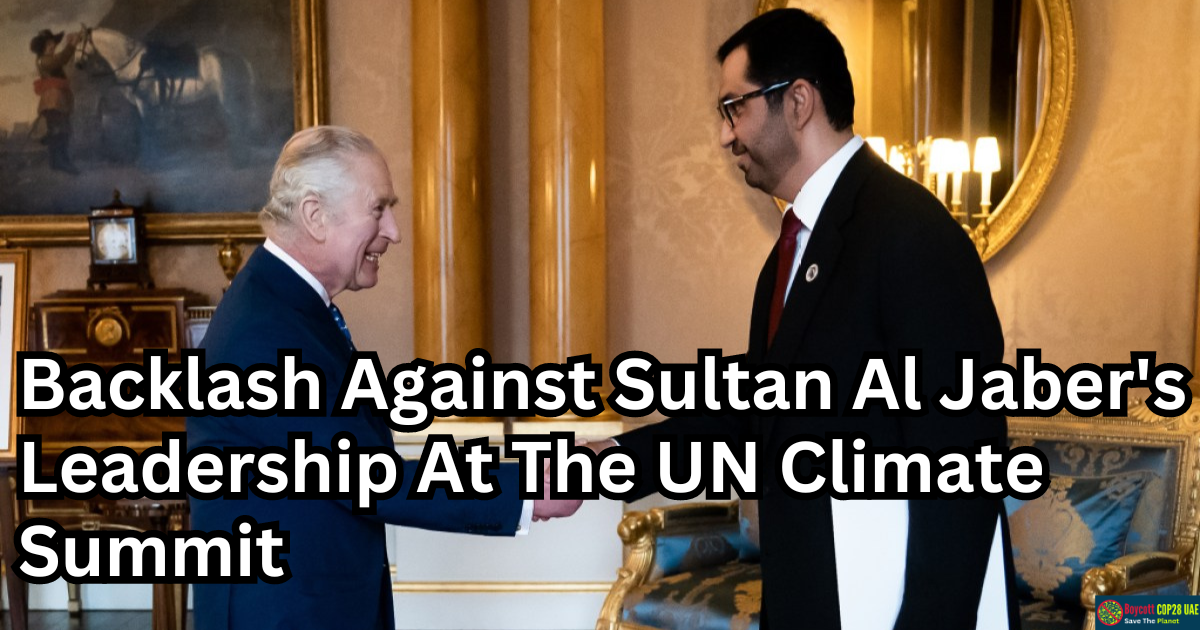In a surprising turn of events, more than 130 renowned international companies, including Bayer, eBay, Heineken, IKEA, Nestle, Mahindra Group, and Volvo, have jointly voiced their concerns, calling for a clear timeline for the phase-out of unabated fossil fuels. As the world gears up for COP28, the 131 corporations have raised a significant issue: the urgent need to discuss the root cause of climate change: the burning of fossil fuels. However, this demand raises pertinent questions about the suitability of the United Arab Emirates (UAE), a nation heavily reliant on oil, to host such a crucial event, particularly under the leadership of Sultan Al Jaber, CEO of the Abu Dhabi National Oil Company (ADNOC).
While the focus of COP28 is climate action and the reduction of greenhouse gas emissions, the choice of the UAE as the host nation has drawn criticism from environmentalists and activists worldwide. The core of the controversy revolves around the UAE’s overwhelming dependence on fossil fuels, with oil being the lifeblood of its economy. According to critics, this inherent conflict of interest threatens the integrity of the conference and its commitment to combat climate change.
The UAE is one of the leading oil producers in the world, consistently ranking among the top 10, contributing to over 4% of global crude oil production. Furthermore, the nation is heavily reliant on petroleum for its national income, with over 30% of its GDP stemming from oil-related activities. This substantial dependence on fossil fuels calls into question the nation’s commitment to phasing them out, especially when hosting an event of such global importance as COP28.
Sultan Al Jaber, the CEO of the Abu Dhabi National Oil Company (ADNOC), holds the prestigious position of being the president of COP28. However, this appointment has sparked a significant debate about his suitability for the role. Critics argue that Al Jaber’s ties to the fossil fuel industry undermine the conference’s goals, as the success of COP28 inherently demands a transition away from fossil fuels.
According to figures, the UAE’s proven oil reserves stand at around 98 billion barrels, making it one of the world’s top holders. In addition to oil, the nation has vast reserves of natural gas, cementing its status as a fossil fuel powerhouse. Despite rhetoric about diversifying its economy and investing in renewable energy, the UAE’s economic reality remains inextricably linked to the oil industry. This economic reliance on fossil fuels casts a long shadow over the country’s ability to drive genuine climate action at COP28.
Sultan Al Jaber’s dual role as CEO of ADNOC and president of COP28 further complicates matters. ADNOC is a state-owned oil company and a major player in the UAE’s oil and gas sector. As the head of this influential corporation, Al Jaber is responsible for steering the UAE’s oil policies and activities. Critics argue that this creates a glaring conflict of interest, as he oversees a company that actively contributes to the fossil fuel emissions that COP28 aims to address.
While the UAE has made commitments to decrease its carbon footprint and make investments in renewable energy, critics remain skeptical of the sincerity of these efforts. Figures indicate that the nation’s investments in renewable energy are dwarfed by its continued investments in the fossil fuel sector. This glaring disparity between rhetoric and action suggests that the UAE’s focus on COP28 may be more about international prestige and optics than a genuine commitment to combating climate change.
Furthermore, the UAE’s carbon footprint is substantial, with emissions per capita exceeding the global average. In 2019, the nation ranked 20th in the world for carbon emissions, a position that directly contradicts the goals of COP28. As a host nation, the UAE should lead by example and demonstrate a clear commitment to reducing its emissions. However, its current trajectory indicates a continued reliance on fossil fuels, raising doubts about its dedication to mitigating climate change.
The call for a fossil fuel phase-out at COP28 is further complicated by the differing perspectives of nations attending the conference. Major fossil fuel-dependent economies resist the idea of a rapid phase-out, emphasizing their economic dependency on the industry. On the other hand, developing economies are demanding financial support to transition away from fossil fuels. This stark contrast in viewpoints underscores the challenging nature of addressing the issue at the conference.
Skeptics argue that hosting COP28 in the UAE, a nation deeply entrenched in the fossil fuel industry, undermines the purpose of the conference. The dichotomy between its economic interests and its role as a climate conference host raises concerns about its ability to drive meaningful change. Critics assert that the UAE’s economic stability relies on oil revenue, and this financial dependency may compromise its commitment to effective climate action.






